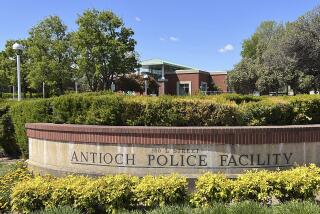No Trial of Police in Biko Case
- Share via
JOHANNESBURG, South Africa — The five policemen who were accused of killing anti-apartheid activist Steve Biko in 1977 won’t be prosecuted because of insufficient evidence, Justice Ministry officials said Tuesday.
A murder charge could not be supported in part because there were no witnesses to the killing, officials said.
Charges of culpable homicide and assault also were considered, but because the killing occurred in 1977, the time frame for prosecution had lapsed.
“We can only prosecute if there is sufficient evidence to justify the charge, but there is not enough evidence.... If at a later stage new evidence emerged that cleared the problems we’ve had, we would reconsider our decision. With a matter like this, we can’t leave it hanging, we must have finality,” said Chris MacAdam, a lawyer for the National Prosecuting Authority.
The ruling African National Congress took issue with the decision, saying it might give the impression that the post-apartheid democratic government tolerated such “evil.”
“We believe that it is unfortunate that the killers of Steve Biko are not being prosecuted. It would have been necessary for such a thing to take place because it was going to set our country on a direct course of reconciliation,” ANC spokesman Smuts Ngonyama said.
In 1999, the Truth and Reconciliation Commission, which was formed to help heal apartheid’s emotional and psychological wounds, denied amnesty to the five men.
To qualify for amnesty, applicants had to prove a political motive for their crimes and tell the commission the full truth.
All five said Biko tried to attack one of his interrogators while in custody in the coastal city of Port Elizabeth. They said they tackled the 30-year-old Biko and accidentally slammed his head against a wall.
An unresponsive Biko remained chained to a metal gate in a standing position for two days while police waited to see whether they could continue the interrogation.
Eventually he was taken in a police van, naked and bleeding, on a 750-mile trip to a prison in Pretoria, where he died of brain injuries Sept. 12, 1977.
Biko’s message of black pride in the mid-1970s appealed to many young people in South Africa’s townships, and his death made him a martyr in the struggle against apartheid.
The case sparked an outcry at home and abroad and spurred activism that contributed to the end of white-minority rule. It also inspired the 1987 movie “Cry Freedom” with Denzel Washington.
More to Read
Sign up for Essential California
The most important California stories and recommendations in your inbox every morning.
You may occasionally receive promotional content from the Los Angeles Times.













